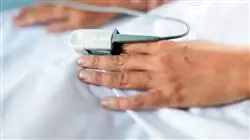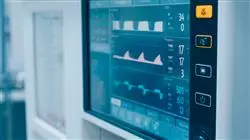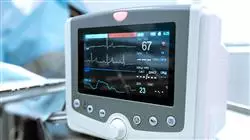University certificate
The world's largest faculty of medicine”
Why study at TECH?
Do you want to avoid complications derived from rhythm disturbances? Bet on TECH and experience a leap in quality in your career"

The Utstein formula is a recognized way to predict patient survival during critical emergencies. This international consensus on cardiac arrest is intended to improve the quality of the data collected, both in studies and in medical reports, allowing more effective comparison of the results. However, there have been new recommendations in this field, so health professionals have been forced to adapt to them with immediacy. In this sense, keeping up with these changes is a real challenge for healthcare professionals.
For this reason, TECH has implemented a pioneering program that will delve into the advances that have arisen in this procedure for doctors to provide the best services. Designed by a first class teaching team, the syllabus will analyze in detail how to properly record hospital cardiopulmonary arrest, as well as international recommendations. In this way, graduates will also master tools for basic monitoring and carry out exhaustive controls to parevent pathologies such as arrhythmias. In addition, the syllabus will delve into resuscitation processes in special situations.
It should be noted that the program is based on the revolutionary Relearningmethodology, a learning system pioneered by TECH, which consists of reiterating the key aspects of the syllabus so that they remain in the student's mind. Learning can be planned on an individual basis, as there are no preset schedules or evaluation chronograms. Furthermore, the Virtual Campus will be available 24 hours a day and will offer users the possibility of downloading the materials for later consultation.
You will master the techniques of Cardiopulmonary Resuscitation in special situations in only 450 hours"
This Postgraduate diploma in Advanced Cardiology Life Support contains the most complete and up-to-date scientific program on the market. Its most notable features are:
- Practice cases presented by experts in Advanced Life Support and Monitoring in the Critically Ill Patient
- The graphic, schematic, and practical contents with which they are created, provide scientific and practical information on the disciplines that are essential for professional practice
- Practical exercises where self-assessment can be used to improve learning
- Its special emphasis on innovative methodologies
- Theoretical lessons, questions to the expert, debate forums on controversial topics, and individual reflection assignments
- Content that is accessible from any fixed or portable device with an Internet connection
Specialize in the CALS Protocol through the best digital university in the world, according to Forbes"
The program’s teaching staff includes professionals from the sector who contribute their work experience to this program, as well as renowned specialists from leading societies and prestigious universities.
The multimedia content, developed with the latest educational technology, will provide the professional with situated and contextual learning, i.e., a simulated environment that will provide immersive education programmed to learn in real situations.
This program is designed around Problem-Based Learning, whereby the professional must try to solve the different professional practice situations that arise during the academic year For this purpose, the students will be assisted by an innovative interactive video system created by renowned and experienced experts.
You will control conflict prevention systems with this advanced program"

Thanks to TECH's Relearning system, you will reduce long hours of study and memorization"
Syllabus
This syllabus, developed by a first level teaching group, will delve into the approach to patients in CPR situations, both in episodes and during recovery. Consisting of 3 modules, the program will analyze the application of new technologies in Life Support. In addition, the training will delve into clinical simulation, emphasizing didactic evaluation.

This university program will allow you to fulfill your professional aspirations in just 6 months. Enroll now!”
Module 1. Cardiopulmonary Resuscitation and Respiratory Plan
1.1. Research Methodology
1.1.1. Analysis of the Typology of Studies
1.1.2. Design of a Research Plan
1.1.3. Development of a Research Plan
1.2. Research Ethics
1.2.1. Bioethics Applied to Research
1.2.2. The Research Ethics Committee (REC): Local vs. University
1.2.3. Designing a Research Protocol for Submission to the Research Ethics Committee
1.3. The Hospital Cardiopulmonary Resuscitation Committee
1.3.1. Design of the Objectives
1.3.2. Design of Contents
1.3.3. Implementation of an RCPH Plan
1.4. The Hospital Cardiopulmonary Resuscitation Plan
1.4.1. Design of the Objectives
1.4.2. Design of Contents
1.4.3. Operationalization of a CPRH Plan
1.5. Development of a Knowledge Transfer Plan in CPR Research
1.5.1. Development of a Knowledge Transfer Plan within CPR Research
1.5.2. Basis for the Publication of a Scientific Article
1.5.3. Bibliometrics
1.6. Prevention of Cardiorespiratory Arrest (CPR)
1.6.1. Diabetic Ketoacidosis (DKA) PreventionPrevention of PCR
1.6.2. Development of a PCR Prevention Plan
1.6.3. Operationalization of a PCR Prevention Plan: Results
1.7. Rapid Intervention Teams (RITs)
1.7.1. Scientific Basis
1.7.2. Design and Development of an EIR
1.7.3. Implementation and Operationalization of an EIR
1.8. Hospital Risk Map
1.8.1. Hospital Risk Map
1.8.2. Design
1.8.3. Analysis of Results and Decision Making
1.9. Equipment of Specific Areas
1.9.1. Life Support Equipment
1.9.2. Distribution of Equipment According to the Area
1.9.3. Ratio of Equipment / Care Area
1.10. Registration of Hospital Cardiorespiratory Arrest
1.10.1. Registration of Hospital Cardiorespiratory Arrest
1.10.2. Models
1.10.3. The Utstein Style
Module 2. Life Support Training in the Critical Care Patient
2.1. Life Support Training Programs
2.1.1. Life Support Training Programs
2.1.2. Programming, Definition of Objectives and Establishment of Didactic Resources
2.1.3. Diagnostic and Didactic Evaluation Program
2.2. Advanced Life Support Training Programs
2.2.1. Advanced Life Support Training Programs
2.2.2. Programming, Definition of Objectives and Establishment of Didactic Resources
2.2.3. Diagnostic and Didactic Evaluation Program
2.3. Training Programs in Special Situations and Patients
2.3.1. Training Programs in Special Situations and Patients
2.3.2. Programming, Definition of Objectives and Establishment of Didactic Resources
2.3.3. Diagnostic and Didactic Evaluation Program
2.4. Logistical Resources Applied to Life Support Education
2.4.1. Logistical Resources Applied to Life Support Education
2.4.2. Analysis of the Different Support: Scientific, Audiovisual, Simulation and Physical
2.4.3. Methodological and Objective-based Adaptation for the Selection of the Teaching Material
2.5. Methodology of Life Support Teaching Training
2.5.1. Training Methodology
2.5.2. Method and Didactic Style
2.5.3. Expository Method and Demonstrative Method
2.6. Didactic Communication of the Life Support Plan
2.6.1. Didactic Communication
2.6.2. Diagram of the Didactic Communication
2.6.3. Didactics of Expression and Didactics of Interpretation
2.7. Methodology for the Evaluation of the Life Support Plan
2.7.1. Methodology for the Evaluation
2.7.2. Classification of the Evaluation
2.7.3. Integrated Life Support Workshops as a Tool for Didactic Evaluation
2.8. Conflict Management in Teaching
2.8.1. Conflict Management in Teaching
2.8.2. Conflict Prevention Systems
2.8.3. Methodology for Conflict Management Established
2.9. Clinical Simulation
2.9.1. Clinical Simulation
2.9.2. Methodological Bases for the Use of Clinical Simulation in Life Support Training
2.9.3. Didactic Evaluation within the Clinical Simulation Model
2.10. Academic Debriefing and Behavioral Aspects within Life Support (LS) Education
2.10.1. Academic Debriefing and Behavioral Aspects
2.10.2. Classification and Methodological Basis: Basis for Emotional Self-Management
2.10.3. Application within Life Support Teaching
Module 3. Advanced Life Support in the Critically Ill Patient
3.1. International Recommendations
3.1.1. CPR
3.1.2. Basic and Advanced CPR
3.1.3. Basic and Advanced Life Support
3.2. Advanced Life Support (ALS)
3.2.1. Airway
3.2.2. Ventilation
3.2.3. Circulation: Basic and Advanced Monitoring. Pharmacology
3.3. Advanced Arrhythmia Control
3.3.1. Pre-stop
3.3.2. CPR-inducing Rhythms
3.3.3. Post-arrest Rhythmias
3.4. Analysis of Potentially Reversible Causes
3.4.1. Analysis of Potentially Reversible Causes
3.4.2. 4 H
3.4.3. 4 T
3.5. Cardiopulmonary Resuscitation in Special Situations
3.5.1. Special Patients
3.5.2. Extreme Situations
3.5.3. Special Environments: Welfare and Non-Welfare Environments
3.6. Elements Associated with Life Support
3.6.1. Legal Aspects
3.6.2. Humanization in Life Support
3.6.3. Donation and Life Support
3.7. Image Support
3.7.1. Scientific Evidence
3.7.2. Echocardiography
3.7.3. Pulmonary Ultrasound Scan
3.8. Non-cognitive Aspects of Life Support
3.8.1. Humanization in Life Support
3.8.2. Support to Life Support Teams
3.8.3. Support to Family Members
3.9. Post CPR Syndrome
3.9.1. Post CPR Syndrome
3.9.2. Global Management of Post CPR Syndrome
3.9.3. Levels of Scientific Evidence Associated with Post CPR Syndrome Management
3.10. ERC 2021 Recommendations
3.10.1. Basic Life Support (BLS) Recommendations
3.10.2. Advanced Life Support (ALS) Recommendations
3.10.3. Algorithms of action for patients with CRP

A unique training experience, key and decisive to boost your professional development"
Postgraduate Diploma in Advanced Cardiological Life Support
Dive into a unique and transformative educational experience with the Postgraduate Diploma in Cardiac Advanced Life Support Postgraduate Diploma offered by TECH Global University. This exceptional program is designed to catapult your medical skills to the next level, providing you with comprehensive training in the management of critical situations in the cardiac setting. All this, from the comfort of your own space, through our advanced online classes. We invite you to explore an educational approach that goes beyond conventional theory. Our meticulously designed online classes allow you to immerse yourself in the world of cardiac life support with flexibility and accessibility. With a faculty of clinical experts and leading cardiologists, you'll receive an education that combines theoretical knowledge with practical applications, giving you a holistic and up-to-date understanding of advanced life support.
With a faculty of clinical experts and leading cardiologists, you'll receive an education that combines theoretical knowledge with practical applications, giving you a holistic and up-to-date understanding of advanced life support.
Elevate your medical competencies with this postgraduate degree from TECH
At the heart of this program is a commitment to excellence. Throughout online classes, you'll explore advanced techniques and protocols, from fundamental cardiopulmonary resuscitation (CPR) maneuvers to expert management of various cardiac arrhythmias. In addition, you will acquire fundamental skills in the use of the automated external defibrillator (AED), a crucial tool in cardiac emergency response. The Postgraduate Diploma program in Advanced Cardiac Life Support will provide you not only with a recognized certificate, but also with the confidence and competencies necessary to deal with critical situations with precision and empathy. This postgraduate degree represents a unique opportunity to differentiate yourself in the field of cardiology, allowing you to stand out as a highly qualified professional focused on medical excellence. Get ready to transform your medical practice and make a difference in cardiovascular care. Embark on this meaningful educational journey with TECH Global University and enhance your profile in Cardiac Advanced Life Support.Your path to professional growth begins now!







